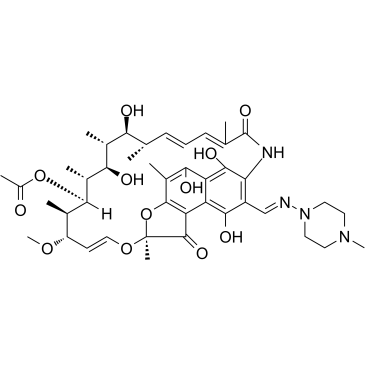
Rifampicin
CAS No. 13292-46-1
Rifampicin( NIH 10782 | NSC 113926 | Rifampin )
Catalog No. M11310 CAS No. 13292-46-1
Rifampicin is a bactericidal antibiotic drug of the rifamycin group.
Purity : >98% (HPLC)
 COA
COA
 Datasheet
Datasheet
 HNMR
HNMR
 HPLC
HPLC
 MSDS
MSDS
 Handing Instructions
Handing Instructions
| Size | Price / USD | Stock | Quantity |
| 500MG | 41 | In Stock |


|
| 1G | 53 | In Stock |


|
Biological Information
-
Product NameRifampicin
-
NoteResearch use only, not for human use.
-
Brief DescriptionRifampicin is a bactericidal antibiotic drug of the rifamycin group.
-
DescriptionRifampicin is a bactericidal antibiotic drug of the rifamycin group.(In Vitro):Rifampicin (100 mg/mL) can block the functional activity of P-glycoprotein. Rifampicin is not a substract for P-glycoprotein. The mechanism of rifampicin resistance is unassociated with the functional activity of P-glycoprotein.(In Vivo):Rifampicin (200, 400 mg/kg) can induce fatty liver at high concentration. Rifampicin (30 mg/kg, i.p.) treatment of S464P biofilms in vivo results in a slight decline, but earlier rebinds in bioluminescence from these catheters compared with the parental signal, whereas rifampicin has no affect on bioluminescence in mice infected with mutant H481Y.
-
In VitroRifampicin (100 microg/mL) can block the functional activity of P-glycoprotein. Rifampicin is not a substract for P-glycoprotein. The mechanism of rifampicin resistance is unassociated with the functional activity of P-glycoprotein.
-
In VivoRifampicin (200, 400 mg/kg) can induce fatty liver at high concentration. Rifampicin (30 mg/kg, i.p.) treatment of S464P biofilms in vivo results in a slight decline, but earlier rebinds in bioluminescence from these catheters compared with the parental signal, whereas rifampicin has no affect on bioluminescence in mice infected with mutant H481Y.
-
SynonymsNIH 10782 | NSC 113926 | Rifampin
-
PathwayMicrobiology/Virology
-
TargetAntifection
-
Recptor14-α Demethylase| DNA/RNA Synthesis
-
Research AreaInfection
-
Indication——
Chemical Information
-
CAS Number13292-46-1
-
Formula Weight822.94
-
Molecular FormulaC43H58N4O12
-
Purity>98% (HPLC)
-
SolubilityDMSO: 100 mg/mL (121.51 mM)
-
SMILESCC(O[C@@H]([C@H](C)[C@H](O)[C@H](C)[C@@H](O)[C@@H](C)/C=C/C=C(C)\C(N1)=O)[C@H](C)[C@@H](OC)/C=C/O[C@](O2)(C)C(C3=C2C(C)=C(O)C4=C3C(O)=C(/C=N/N5CCN(C)CC5)C1=C4O)=O)=O
-
Chemical Name(7S,9E,11S,12R,13S,14R,15R,16R,17S,18S,19E,21Z)-2,15,17,27,29-pentahydroxy-11-methoxy-3,7,12,14,16,18,22-heptamethyl-26-{(E)-[(4-methylpiperazin-1-yl)imino]methyl}-6,23-dioxo-8,30-dioxa-24-azatetracyclo[23.3.1.1(4,7).0(5,28)]triaconta-1(28),2,4,9,19,21,25(29),26-octaen-13-yl acetate
Shipping & Storage Information
-
Storage(-20℃)
-
ShippingWith Ice Pack
-
Stability≥ 2 years
Reference
1.Villain-Guillot P, et al. Drug Discov Today. 2007 Mar;12(5-6):200-8.
molnova catalog



related products
-
Nicoform
Nicoform is an antimicrobial agent.
-
(+)-Aromadendrene
(+)-Aromadendrene is a natural product that has significant antibacterial activity against the Gram-positive and Gram-negative bacteria.
-
Isoschaftoside
Isoschaftoside is used as an intercrop due to its allelopathic inhibition of parasitism by Striga hermonthica, an obligate parasitic weed that can devastate the maize crop.



 Cart
Cart
 sales@molnova.com
sales@molnova.com


